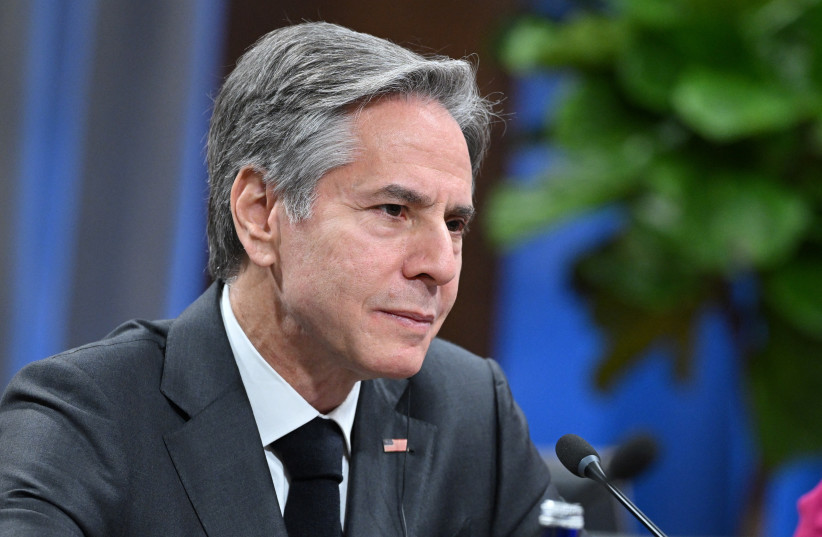Washington will not turn on Israel after new gov't sworn in - opinion

The radical Left of the Democrats in the US House of Representatives – despite that their party has lost its majority – gained several new members in the recent election.
In his 1862 book Rome and Jerusalem, pre-Herzlian Zionist and pre-Marxian socialist Moses Hess described how Papal Rome, the spiritual center of the Holy Roman Empire, sought the annihilation of Judaism. However, if a book Washington and Jerusalem will be written one day, it will describe the vital role played by America in the resurrection of the Jewish people in its homeland. And now, a new chapter is being written with a new government in Jerusalem.
Relations between US President Joe Biden and Prime Minister Benjamin Netanyahu have a long and on the whole positive history, and US Secretary of State Antony Blinken’s speech this month at the J Street conference in Washington may be seen as heralding this new chapter. In tune with Biden’s long-established positions, Blinken praised Israel’s democratic elections and congratulated Netanyahu on his victory, stressing the importance of relations between the US and Israel regardless of the political hue of its government.
He specifically reiterated the importance of American security-related support for Israel, emphasizing that “no peace is possible or sustainable without a strong, secure Israel,” specifying that “our assistance to Israel is sacrosanct” and that “the United States’ ironclad commitment to Israel’s security assistance has never been stronger than it is today.” He also mentioned the administration’s opposition to BDS and anti-Israel discrimination in international forums such as the United Nations.
There were some raised eyebrows over the US secretary of state delivering his speech to an organization that is not known to be supportive of most Israeli positions, and not only toward Netanyahu. However, he probably did so expressly in order to signal to the left of the Democratic Party in Congress, which opposes aid to Israel – including cooperation on security-related issues – that the administration would continue its course, a stance which was also underpinned by recent statements of US Ambassador to Jerusalem Thomas Nides.
As could be expected, Blinken also mentioned Biden’s opposition to settlements and support for a “two-state solution” as well as the need for steps to advance peace and improve the situation of the Palestinians, but it is unlikely that this sufficed to satisfy disappointed listeners at J Street. Though the Palestinian issue is not a top foreign policy priority for the administration – compared, for instance, to China, Russia-Ukraine and the energy crisis – it would be erroneous to assume that the Biden administration was just paying lip service to the Palestinian issue or that this is off the US agenda.
FURTHERMORE, EVEN if the administration does make do with conflict management, it does not mean that its definition of “management” is the same as Israel’s and the upgraded status of the American envoy to the Palestinians, Hady Amr, among other things, shows that this is not the case.
On the other hand, Israel’s experienced and pragmatic prime minister, though perhaps not all his colleagues, can be expected to recognize this and act, lest negative developments, in American eyes, on the Palestinian issue overshadow Israel’s efforts to reach understandings with the administration on other issues, especially Iran. On the latter issue, there are almost certain to be disagreements harking back to the Obama administration.
To wit, in spite of Washington’s currently demonstrated pessimistic attitude to a possible renewal of the nuclear agreement, this might still change, a development which would force Israel to make fateful decisions.
Some unnamed US officials told Politico that the Biden administration will “hold Netanyahu personally responsible” for the actions of his more extreme cabinet members – the paper adding, in contrast to Blinken’s speech, that this approach “underscores the complexity and the growing fragility of the US-Israeli relationship, as a security partner, as well as a haven for the Jewish people – (in fact, Israel has seen this year an unprecedented growth in immigration which is expected to continue).
But especially disturbing were the comments which linked what these officials termed Netanyahu’s “certain goals” with regards to “reining in Iran’s Islamist government in Tehran, which has threatened to destroy Israel” (and we thought that “reining in Tehran” in this respect was also the US goal), to other aspects of the US-Israel relationship.
One trusts that such statements do not reflect Biden’s policy and in any case, even hinting at making Israel’s security hostage to unrelated political demands must be judged morally and diplomatically reprehensible and should be denied by responsible US spokespersons.
Almost every day since the Israeli election, there are well publicized but anonymous hints and comments usually emanating from Washington, but sometimes from Israeli opposition sources – not to mention unbalanced editorials and related articles in The New York Times – warning the new government not to take steps towards annexation in Judea and Samaria or to change the status quo on the Temple Mount, though these steps are not in Netanyahu’s agenda anyway.
As Blinken mentioned, relations between the US and Israel cover a whole plethora of topics in the lives of the two countries and peoples – for Israel, this includes the situation of American Jewry, the rising tide of antisemitism and American Jewry’s impact on Israel and vice verse.
Foreign and domestic policies intertwined
IN BOTH Israel and the US all politics is local and foreign policy is often intertwined with domestic politics. The radical Left of the Democrats in the US House of Representatives – despite that their party has lost its majority – gained several new members in the recent election, a position it will try to leverage in order to squeeze policy changes from the administration, including on Israel (and sad to say, they were abetted in this by two Jewish former senior diplomats).
Another subject of pending uncertainty for US-Israel relations is Israel’s close economic-technological ties with China. For the US, this is not only an issue of economic competition and markets, but primarily one of strategic and geopolitical concerns. Israel, despite the many important benefits from its ties with China, should not ignore America’s concerns so as to not endanger its overall ties with its most important ally.
Indeed, Israel’s relations with the US are more varied and complex than ever before. From time to time, these relations may also entail difficulties and crises, which as experience shows, can often be dealt with by wise diplomacy and finding compromises on both sides – or if not that, by finding convincing arguments for postponing them to a later date.
However, for the next few years, the extreme polarization in American politics and society may mean that Israel’s diplomacy will have to be even more astute than before and in any case be guided by the rule set by the late Moshe Dayan, namely risk confrontations only on truly vital matters.
The eminent American historian Walter Russell Mead, one of the most senior and respected experts on US foreign policy, in his recently published book, The Arc of a Covenant: The United States, Israel and the Fate of the Jewish People, advances the thesis that the US-Israel alliance is not only stable but that American support for Israel over the past forty years served the American interest and that America needed Israel and not the other way around.
While one may not agree with this in totality, the author’s claim gains additional credence also from other sources, given that in the current Middle Eastern reality, Israel and its status as “a regional superpower” plus the Abraham Accords is America’s most stable ally in the region.
The writer, also a former MK, served as ambassador to the US from 1990-1993 and 1998-2000.
Jerusalem Post Store
`; document.getElementById("linkPremium").innerHTML = cont; var divWithLink = document.getElementById("premium-link"); if (divWithLink !== null && divWithLink !== 'undefined') { divWithLink.style.border = "solid 1px #cb0f3e"; divWithLink.style.textAlign = "center"; divWithLink.style.marginBottom = "15px"; divWithLink.style.marginTop = "15px"; divWithLink.style.width = "100%"; divWithLink.style.backgroundColor = "#122952"; divWithLink.style.color = "#ffffff"; divWithLink.style.lineHeight = "1.5"; } } (function (v, i) { });

